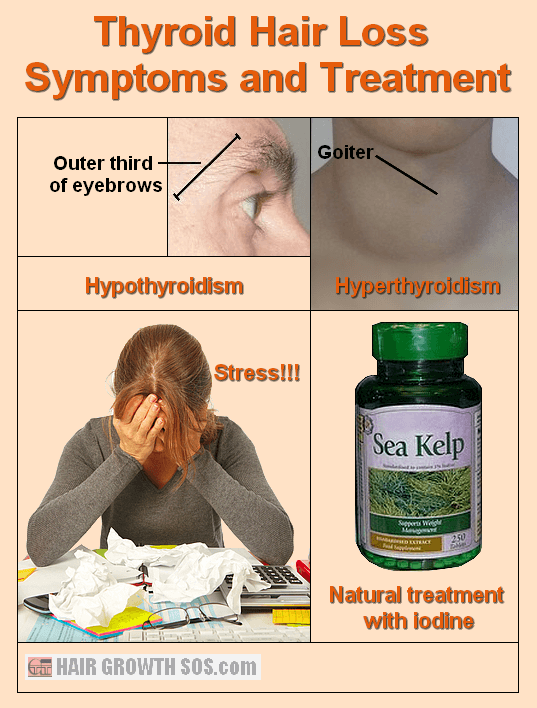- Home
- Causes of Hair Loss
- Thyroid
Have You Got Thyroid Hair Loss?
By Paul Taylor
If you suspect you have thyroid hair loss, you must get it checked and confirmed by a doctor.
That's because there are several thyroid conditions which can become long-term (chronic) and, at some point, cause your hair to start thinning or falling out.
So, the longer you've had hair loss, the longer you might have been developing a thyroid problem which needs sorting out. And obviously a medical expert is the only real way to confirm which condition you have.
This page should give you a good idea about whether or not your hair
loss might be thyroid-related. And, therein, help you identify which type of thyroid condition you might have.
Thyroid Role and Thyroid Diseases
Your thyroid gland plays a very important role in your body. It controls the rate of metabolism, affects your energy levels, heart rate, etc.
So it’s unfortunate then that thyroid disorders are quite common, especially in the elderly. Over 12% of the US population develop a thyroid disorder at some stage, and 60% of cases are undiagnosed (subclinical).
Women are affected the most. They are five to eight times more likely to develop a thyroid disorder than men. And to make matters worse, the cause of many thyroid disorders is largely unknown (1)(2).
Thyroid conditions usually develop very slowly, which is why they might go undiagnosed for years. This, of course, also gives any thyroid-related hair loss you start to develop, plenty of time to get worse.
Thyroid conditions can also affect your ability to function or work well, which can then cause stress - something which will only make your hair loss worse!
Here are the three most common thyroid disorders:
1. Hyperthyroidism
Hyperthyroidism develops when the thyroid gland produces an excess of hormones which then stimulate many of the body's functions.
So, given that hair is one of the fastest growing parts of the body, it’s easy to see how this type of thyroid hair loss might develop: if the hair growth cycle is accelerated, it can get forced through anagen (the growing phase) and into catagen (the shedding phase) sooner than it otherwise would.
And this can then get noticed as an increase in your rate of hair loss.
Also, your hair is very much a gauge of your general health. So if you fall ill (i.e., from a thyroid disorder), increased hair loss might be one of the first signs that something is wrong.
Most cases of hyperthyroidism (about 75%) are due to Graves' disease - an autoimmune disease which is probably passed on genetically.
Other autoimmune disorders, including thyroiditis (see below), can also cause this condition.
Symptoms include:
- Weight loss
- Hair loss (3)
- Frequent bowel movement
- Swelling of the neck (goiter - see image above)
- Heat intolerant
2. Hypothyroidism
Hypothyroidism is when the thyroid gland produces a deficiency of hormones causing many body functions to slow down.
Hypothyroidism is often caused by thyroiditis, especially Hashimoto's thyroiditis (which is an autoimmune disease that seems to be genetic). It can also be congenital (from birth) or due to a dietary deficiency in iodine.
Symptoms include:
- Weight gain
- Hair loss and hair thinning (3)
- Constipation
- Swelling of the neck (goiter)
- Cold intolerant
This type of thyroid hair loss can also include thinning, or even complete baldness, in the outer third of both eyebrows.
It's
interesting to note that these symptoms seem to be either exactly the
same, or completely opposite, to those of hyperthyroidism. Also,
both these disorders appear to be linked to a genetic autoimmune disease
- Graves' disease in the case of hyperthyroidism, and Hashimoto's
thyroiditis in the case of hypothyroidism.
3. Thyroiditis
Anything with the word "itis" means inflammation. Thyroid inflammation is mostly caused by Hashimoto's thyroiditis (as already mentioned), a virus, or pregnancy-related (postpartum thyroiditis).
It's possible that symptoms can be the same as in hyperthyroidism followed by those of hypothyroidism.
Treatment for Thyroid Hair Loss
Conventional treatment for the thyroid conditions mentioned above can include one or more from: drugs, radioactive iodine capsules and surgery.
What a choice!
There are all sorts of alternative treatments including different types of seaweed such as kelp (i.e., to supply iodine) and various vitamins and other food supplements said to be of help.
My own hair regrowth techniques should also be able to help, but the underlying condition does need to be identified and rectified first.
|
Like this page? |
|


